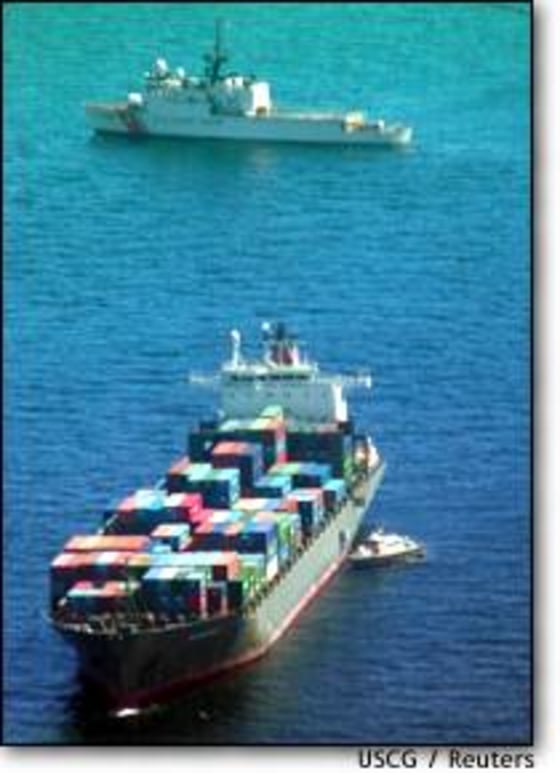An end-of-the year federal deadline to submit maritime anti-terrorism plans has ports, vessel owners and even some recreational marina operations scrambling to comply or face stiff penalties that include being shut down in the most egregious cases.
The Dec. 29 Deadline stems from provisions in the Maritime Transportation Security Act of 2002. The law blankets the entire maritime sector, requiring detailed security plans to be in place by July 1, 2004. The blueprints of those plans, however, must be in the hands of the Coast Guard by the deadline.
Although the initial rules were issued in July, the final orders weren’t issued until mid-October when some parts of the maritime industry got a break while others were surprised that the rules applied to their businesses. For instance, ferry operators and some small passenger vessels were told they would not have to implement “airport-like” passenger screening. But some recreational marina operators and boat yards were told that they would be expected to submit a security plan.
“Yes, we were surprised,” said Frank Herhold, executive director of the Marine Industries Association of South Florida, which represents some 800 various marinas, boat yards and businesses.
“We don’t take in the large commercial vessels, cargo vessels — our vessels are strictly recreational, but they do come in from international waters and that’s the trigger,” he said. Often those are “mega-yachts,” over 80 feet in length.
“I think something we’ve recognized throughout this process is that the maritime community is very diverse,” said Jolie Shifflet, a Coast Guard spokeswoman. The regulations were written to be flexible, she said, noting that there are “waiver and equivalency provisions” in the rules to account for something “that was unintentionally captured in the regulations.”
Scrambling for answers
Herhold said the members of his association are scrambling to determine just what they are expected to do. “Right now there are more questions than answers,” he said. However, Herhold praised the Coast Guard for its help in sorting through the requirements. “They’ve been extremely cognizant of the recreational industry,” he said.
The deadline will be tough to meet, Herhold said, and costly, given that no federal money is being made available. The association is trying to come up with an acceptable security template that everyone can use, Herhold said.
Penalties for non-compliance include $25,000-per-day fines and the possibility of having an operation shut down.
There are some 10,000 vessels, 5,000 facilities and 361 ports affected by the rules, Shifflet said. Also affected are 40 offshore facilities, such as oil drilling platforms.
About 4,000 vessels fall under an alternative security plan, Shifflet said. These plans were created to allow certain types of vessels, such a gambling boats operating on the Mississippi river, to follow a standardized security plan.
Shifflet said the Coast Guard has received some plans, but “nowhere near the volume we expect to receive. We really do expect that the majority of plans will be submitted much closer to the deadline.”
Submitted, not asked for
Some of the plans being submitted aren’t required and aren’t asked for, according to the Coast Guard. These plans belong to foreign-flagged ships, such as cargo ships registered in countries like Panama or Liberia.
The Coast Guard has sent letters to foreign ship owners saying they are not required to submit security plans for approval; instead, the Coast Guard will accept security plans approved by the country in which the ships are registered.
The Coast Guard’s official stance has raised the ire of some in Congress who say accepting the security plans of a foreign country like Liberia is compromising security and was never what Congress had in mind when it passed the law. A bill was passed recently by the House and is now waiting on a companion Senate bill that would “make it abundantly obvious that these security plans must be submitted by all vessels,” said Dennis Bryant, senior counsel with Holland & Knight and a former lawyer for the Coast Guard.
“There’s a significant problem here. As of right now, very few foreign ship owners are likely to submit security plans to the Coast Guard by Dec. 31,” said Bryant, who represents several foreign ship owners. “I have taken the position that if the foreign-flagged vessel doesn’t submit security plans to the Coast Guard … that if there’s a terrorist incident involving that vessel in U.S. waters, the owner may not be able to limit their liability.”
Nightmare on horizon
Filing the plans by the December deadline is just part of what the law requires, according to Bryant. Even if a facility or vessel meets the plan deadline, the plans have to be implemented by July.
“My personal impression is that the [implementation] deadlines are virtually impossible to meet,” Bryant said, noting that he’s not trying to be an alarmist.
“The maritime security in the U.S. and worldwide is much better today than it was on Sept. 10, 2001,” Bryant said. “And on July 1, 2004, it will be better than it is today, but I don’t expect that on July 1, 2004, we will have security programs at all these ships and facilities that are fully implemented, that are really doing what the national and international standards envision just because they set impossible deadlines.”
The Coast Guard’s Shifflet acknowledges that the timeline is a tough one. “But people shouldn’t be waiting for approval to start implementing their plan,” she said.
Despite the fact that the Coast Guard has hired outside firms to help review the plans, “we don’t know how long the [Coast Guard’s security] review will take,” Bryant said. “So they submit the plan at the end of December, the review takes several months, it comes back and then they start training? I mean this is going to be a nightmare.”
